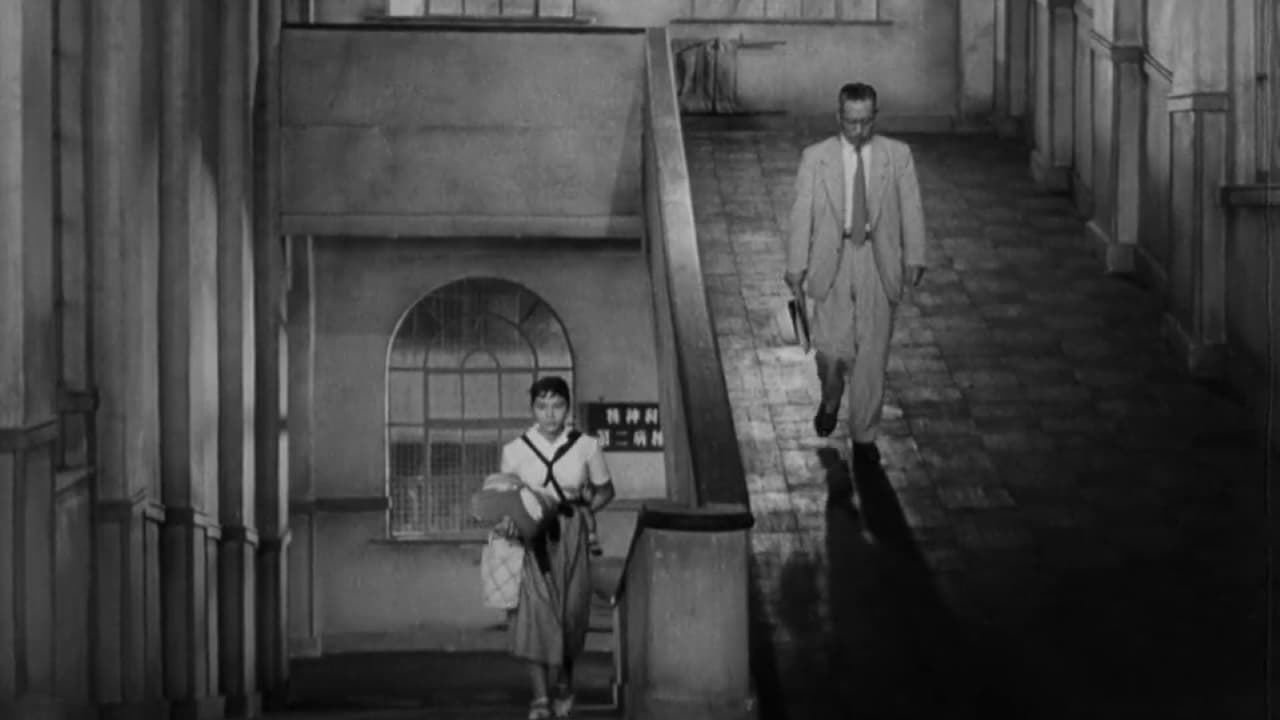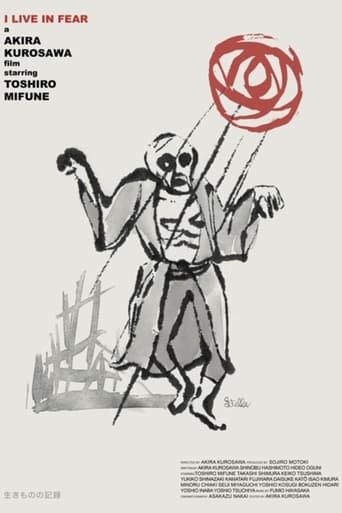

What a beautiful movie!
... View MoreIt's complicated... I really like the directing, acting and writing but, there are issues with the way it's shot that I just can't deny. As much as I love the storytelling and the fantastic performance but, there are also certain scenes that didn't need to exist.
... View MoreIn truth, there is barely enough story here to make a film.
... View MoreGood films always raise compelling questions, whether the format is fiction or documentary fact.
... View MoreI love Akira Kurosawa. However this movie made me so angry I couldn't get through more than half of it. Who the hell does that family think they are. The man was IN NO WAY mentally incompetent and having him declared so was a shocking injustice. He only went crazy after he was denied the rights to his own property in a kangaroo court.What a joke, if you could have somebody declared incompetent because the mooching children didn't want to move to a new location our asylums would be overflowing 100x more than they already are.What a shocking injustice...I can't believe more people aren't blown away by the lack of a business owners right to do as he wishes with his own property. I wish he would have snapped and murdered his entire ungrateful POS family by finding some way to leak radiation into their rooms.
... View MoreIn 1950s Japan, a local magistrate (Takashi Shimura) resides over the case of Kiichi Nakajima (Toshirô Mifune), an old man who's so spooked by the prospect of nuclear fallout that he intends to sell his assets and emigrate his large family to Brazil. The family, of course, has other ideas, and seek to have their father declared insane. Though the magistrate reluctantly votes to freeze the old man's assets, he himself becomes troubled by the possibility of nuclear apocalypse. Given what had happened in Nagasaki and Hiroshima, I wouldn't be surprised if such sentiment was widespread in Japan.Mifune, then aged just 35, is completely convincing (under copious amounts of make-up) as the aging, increasingly-paranoid patriarch. Indeed, I didn't realise it was him until I looked up the film's IMDb page. The performance itself is pure ham, not unlike something Klaus Kinski or Jack Nicholson might have conjured up, but there's such intensity in his inner anguish that he is almost painful to watch. The old man's fear of nuclear holocaust ultimately leads him to a mental institution, but Kurosawa blurs his insanity: is he crazy, or is everybody else crazy for not being scared?One scene I found particularly touching. After the old man suffers a serious heart attack, his family gathers around to discuss money arrangements should he die. Meanwhile, the youngest daughter, perhaps the only family member who sympathises with her father's plans, leafs through a photo album. On every page, we find smiling faces, a happy family. It suddenly struck me that, until then, I'd scarcely scene a smiling face for the entire film. Perhaps more than anything, 'I Live in Fear (1955)' is about the breakup of a family, the rupture of a social unit traditionally considered invulnerable.
... View MoreThis is an odd little curio from the Cold War era. I think it played a lot better back in the 1950s, as today many younger viewers won't be able to relate to the theme...it will all seem too weird and too tough to understand.Toshiro Mifune plays a man much older than he actually was--so he's had his hair whitened for the film and he walks about hunched over like an old man. He suffers from a severe obsession--that Japan is going to be destroyed by a nuclear war. Now back then, such worries were pretty common--and pretty normal. But, the degree to which this bothers him is extraordinary. He simply cannot function as he is so obsessively worried--and insists as the family patriarch that his entire family move to the only safe place on Earth--the Brazilian rain forest! He also wants to sell off the family's profitable business--a factory that employs hundreds of workers.Much of the film concerns the family's reaction to the mania--a tough balancing act between traditional Japanese reverence for the elderly as well as the family standing against this tradition to oppose him. It also concerns the reaction of one particular person outside the family (Takashi Shimura)--a man who sits on a committee of three to decide whether or not Mifune is competent to control the family assets.Eventually whether or not the family moves and sells the business is decided by Mifune and the end of the film is rather heart-breaking. In fact, it's a bit of a missed opportunity in a way. You see, in many ways, Mifune is the NORMAL person through much of the film because others are NOT so concerned about nuclear annihilation! But, this is completely lost in the end when you see that, yes, Mifune's character is 100% crazy! Not a bad film, but one that just seemed to miss the mark a few times--especially at the end. After all, what was it really trying to say?! I'm not exactly sure.
... View MoreThere is something Shakespearian about Kurosawa. He deals with huge themes, and is willing and able to deal with multiple themes and work on many levels. A strong and evocative story-line with fascinating central characters is his starting point, and he directs with compassion, imagination and the eye of an artist. Many of the frames are filled with beautifully balanced shots that are rarely seen outside of the work of a handful of great directors. He is not afraid to shoot actors from behind or from awkward but revealing angles. This is one of the most gripping and satisfying Kurosawa films I have seen. The image of the sacrifice of the foundry and the theme of destruction by atomic war brings to mind Tarkovski's The Sacrifice. Indeed, with so much drenching rain in some scenes, and with Tarkovski's known admiration for Kurosawa, it is quite possible that this film did have some influence. The story is about an extended family who are charging their father with insanity as he is determined to sell up the family business and move to Brasil because of his fear of atomic radiation engulfing Japan. Atomic radiation was a major cause for concern in post-war Japan, and there were many books and newspaper articles at the time explaining that the Earth's wind currents would bring radiation from atom bomb tests and from atomic war to Japan. This fear was the impetus for such monster films as Godzilla. However, Kurosawa is also using the radiation as a symbol for modern development - the changes that are taking place to the traditional Japanese ways, mainly from the mysterious modern world beyond Japan's shores. The film opens not with the family, but with a dentist who is to be one of the judges who will decide on the old man's sanity. It is notable that the dentist works in bright, clean, modern surroundings with modern equipment, while the old father owns an old, dirty, dark, dangerous foundry where the workers have to be warned to take care of the fires or the place will be engulfed. We first encounter the family as they squabble outside the informal family court room where the case will be heard. The heat, anger and irritation are made very clear - there are sweat stains and angry swishing of fans throughout this and many of the other early scenes. It was at this point that I knew that I was going to enjoy this film a lot. There are many films that within the first ten minutes you know if the director is confident and in charge, and is ready to take risks. There is no doubt at this point that the placing of the actors, the camera angles and even the actors' gestures has been controlled by the director and that everything is working smoothly and effortlessly in the right direction. Even though the story is about the father and his family, we are kept in contact with the dentist throughout the film, even when the court case is over. And it is he we see in the final scene walking down the slope of the hospital as the father's youngest daughter walks up.This is a film about a family. This is a film about moral values in a changing world. This is a film about the fear of modern society. This is a film about a Japanese society coming to terms with itself and its relationship with the outside world in the aftermath of the Second World War. This is a film about living in fear. This is an awesome film. I understand that this is the film that Kurosawa himself was most proud of. And I can certainly see why.
... View More